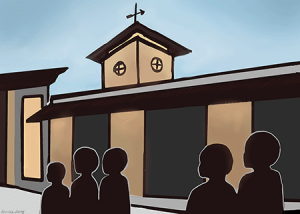$15 Minimum Wage is Long Overdue
March 16, 2021
In today’s economic climate, a minimum wage increase to $15 is long overdue. Raising the minimum wage to $15 would bring many Americans above the poverty line and would begin to close the growing income gap present in our society. Despite arguments that raising the minimum wage would cost America jobs, studies show that giving workers more money to spend would stimulate the economy, generating more business activity and job growth. Additionally, 67% of Americans support raising the minimum wage to $15 (Pew Research Center).
The federal minimum wage has not been raised since 2009. Since then, it has sat at a mere $7.25/hour, with wages being even lower ($2.13/hour) for tipped workers (CNN). For workers with dependents, the current minimum wage cannot even lift them and their families above the poverty level. If you are an adult who works 40 hours a week and earns the minimum wage, you make around $15,080 per year. For an individual, this is barely sufficient to stay above the federal poverty level of $12,880/year. However, if you have someone else to support, this pay is not enough to raise you above the federal poverty line for people with dependents, which is $17,420/year. Of course, we shouldn’t only be trying to help our citizens creep above the poverty line. America, one of the richest countries in the world, should be ensuring that every single person living and working here can feed their children, pay their bills, and have extra money for a rainy day. Raising the minimum wage to $15 would be a small step towards this goal.
Raising the federal minimum wage would also help to close the income gap that disproportionately affects minorities. Currently, 1.2 million workers make below the federal minimum, and states with the largest proportion of minimum wage workers (Mississippi, Louisiana, South Carolina) are those that do not have a higher statewide minimum wage. If the minimum wage were raised, it would generate $107 billion in higher wages for workers, with 31% of African Americans and 26% of Latinos getting a raise. 59% of those who would benefit from a $15 minimum wage are women, 28% of whom have children (the Economic Policy Institute).
Though a $15 minimum wage might seem like a shock to the economy, especially for small businesses, the Raise the Wage Act would gradually implement the $15 wage by increasing the minimum wage each year until the $15 ceiling is reached. This would probably happen in 2025, by which point even $15 will be too low when adjusted for inflation. This gradual implementation will give businesses and the economy time to adapt. According to the Economic Policy Institute, after the minimum wage was raised in 1968 (the highest it’s been historically), gaps in racial earnings closed while simultaneously avoiding a decrease in employment opportunities for underpaid workers. Therefore, there is historic precedent for raising the minimum wage.
Many individual states have already elevated their statewide minimum wage. California currently has a $14 minimum wage, and is a one-fair-wage state, along with six others. In one-fair-wage states, tipped workers have the same minimum wage as everyone else. Although it’s been implied that raising the minimum wage for tipped workers (another part of the Raise the Wage Act) would hit the restaurant industry hard, these seven states had stronger restaurant growth than states with a lower minimum wage for tipped workers (the Economic Policy Institute). Additionally, if we start to pay people more and help to elevate them above the poverty level, the government will also be able to spend less money on federal support programs like Medicaid and food stamps, as less families will have to depend on them to get by. These programs cost taxpayers more than $107 billion a year, and though they will always be necessary to help people in need, congress members shouldn’t be resisting a minimum wage hike when it’s just as big a help to Americans as Medicaid is.
An increase in the federal minimum wage is long overdue. Our current minimum wage is barely sufficient for a single person to live on, let alone a family. Studies have shown that workers in low wage jobs and their families will benefit the most from an increase in income. In the past, minimum wage increases have improved infant health while also reducing child abuse and teen pregnancy (the Economic Politcy Institute). By raising the minimum wage to $15 we will be creating a better future for every American, and building a country that can live up to its slogan, the “land of the free,” because we are never truly free until we help free those around us. To raise the minimum wage is to release people from the chains of poverty, the wrath of inequality, and the uncertainties of a future in which the will of the people does not succeed.









ovitt • May 12, 2021 at 3:45 pm
Bravo. No one can live on anything less than 15 bucks an hour, and, even then, it would take at least two earners to approach the threshold for paying rent, purchasing health insurance (which should be paid for through a capital gains tax), buying food, paying for transportation (in the era of three dollar per gallon gas)–after all, 15×40 is a mere 600 a week…Wall Street types make that in ten minutes and who does more for our world, people who move around money or people who grow, transport, and sell us our food; repair our cars and plumbing, take care of our children?